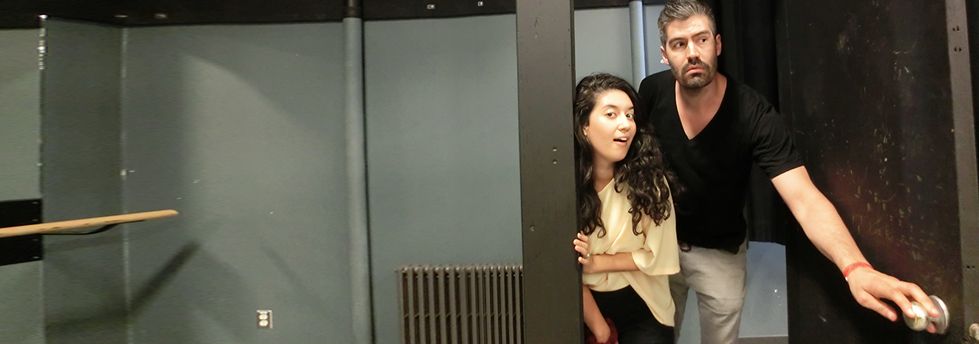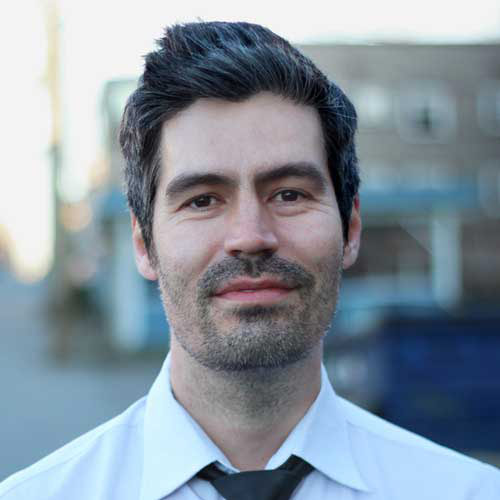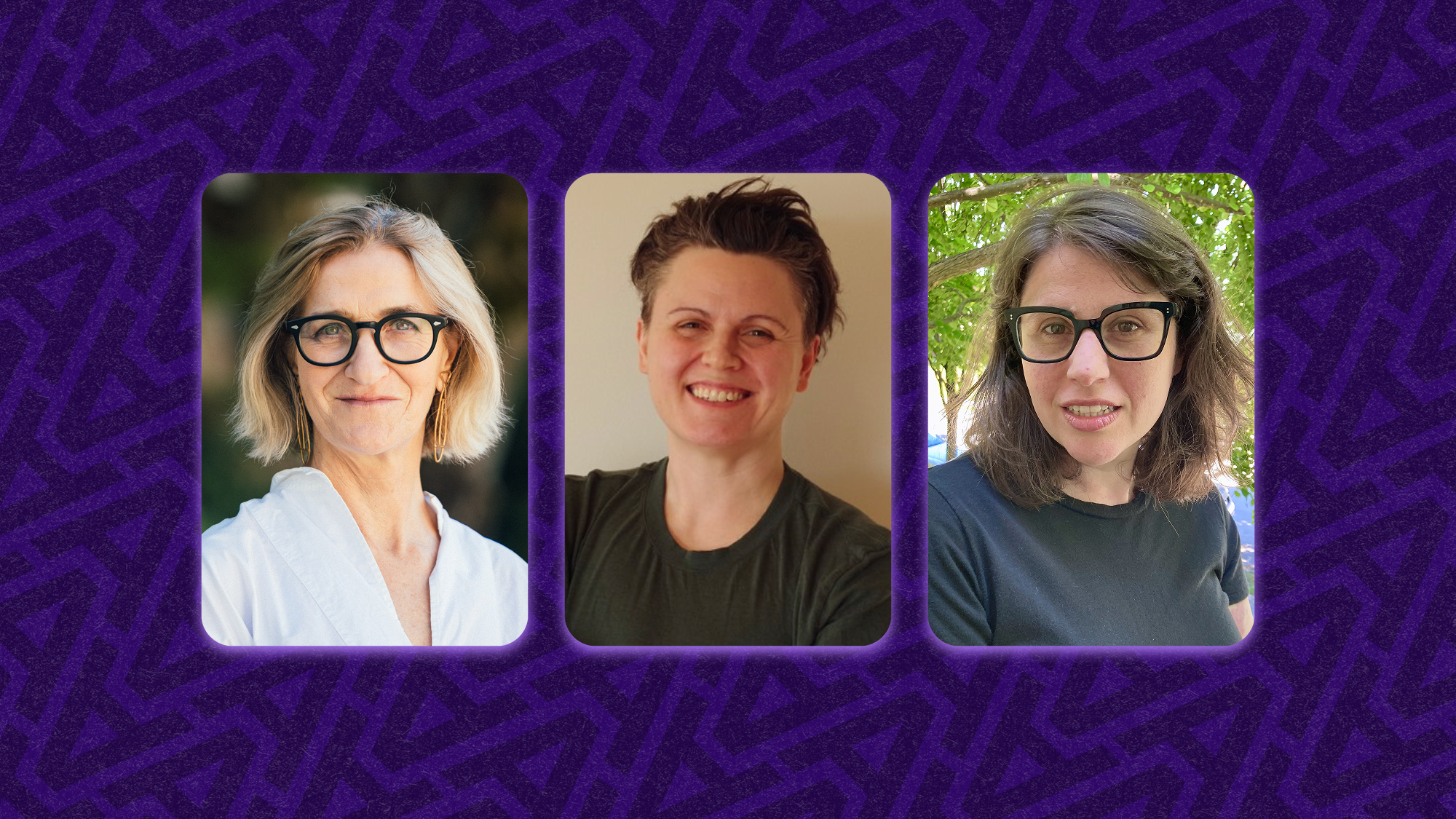

Allen Morrison is a UBC Fine Arts alumnus, an actor with Vancouver TheatreSports, and the instructor of UBC’s first-ever improv course, THTR 440. ArtsWIRE spoke with Morrison and one of his students, Ivanna Besenovsky, about the challenges of performing improv, and what improv has taught them about life.
ArtsWIRE: How did the idea to create an improv course first come about?
Morrison: I’ve been working professionally in improv for the past 10 years, and I was shocked that UBC didn’t offer it. All the acting schools in town have improv, and students are hungry for it. It kind of transcends acting; people do it to improve their public speaking, their presence, to build confidence. So I thought to myself, “It’s only a matter of time before UBC offers improv. Why shouldn’t it be me who does it?” So I pitched it to them.
ArtsWIRE: How do improv actors divide their focus between developing the scene and responding to the audience?
Morrison: It really is kind of a marriage. You have to be constantly aware of how the audience is receiving what you’re doing. And in any given scene, there are actually three people. There’s you, there’s your scene partner, and there’s the audience. You never want to forget that they’re there.
One of the cool things about being in an improv show is that you sort of fall into this trance. But you can’t ever lose yourself in that state because it’s still a show, and you’re still in a relationship with the audience. Knowing how to divide your focus develops over years of stage time.
ArtsWIRE: Would you say that each audience brings a different kind of energy?


UBC Theatre alumnus and instructor Alan Morrison
Morrison: Oh yeah. I do shows all over the city, especially in TheatreSports on Granville Island. TheatreSports really attracts a wide demographic. So sometimes on a Friday night, you’ll have a bunch of people who are getting blitzed before they go out to the club. On a Thursday night, you might have a more theatrical, quiet crowd. Maybe on a Wednesday you’ll have, for whatever reason, some school from Northern BC, so you’ll have 30 grade 8 kids. So these are vastly different audiences. We also have different time slots, and these will dictate the kind of content you’ll do in the show. So in the later shows, there’s no bar, and you can go a little bit more blue if you want to. And you have to read the audience as well. The first couple of scenes in a show, you’ll really be paying attention to what’s landing – whether the audience wants games, or scenes, or maybe they want to see really bold characters – and you cater the rest of the show to that. So it’s neat, because you’re morphing the show as it goes along.
Besenovsky: I had an English class today, and we were talking about how performance doesn’t exist without the audience. So I think that’s really interesting, this dynamic of energy transference, and also this balance of equal value where the audience is just as critical as the performance.
Morrison: That’s something that was really important to me when I was formatting how the class was going to be. It’s one thing to do scenes in class. But it changes entirely during a performance, because there’s this whole jolt of adrenaline that comes when you’re in front of a crowd. And even if it’s a small, friendly crowd, it’s a different ballgame. It’s a different set of physiological reactions that go on in your body.
When I first started improv, I would get nervous before shows. Before performing in front of people, my breathing would be very shallow. But when you’re like that, you’re not open to the impulses that come from breathing deeply. My performance would suffer. So I had to trick myself to not be nervous. But even though you’re trying to train yourself to be as open to impulse as you possibly can, it’s ideal to be as relaxed as you can be. It’s a bit of a contradiction.
ArtsWIRE: How do you achieve that?
Morrison: I recognized it, for one thing. My girlfriend at the time came to a show. And she saw me on stage, watching the scene with my head tilted down, when I was waiting for my turn to go on. And at the end of the show, she said, “Allen, you look like it’s hard. You look like it almost hurts to be on the side.”
So I adopted this little trick of tilting my head up, being more wide-eyed, even having a bit of a grin on my face. You have to trick yourself into enjoying the moment, because people want to watch people who are enjoying what they do. If I watch someone who’s having fun, I could watch them forever, because it’s so totally engaging.
ArtsWIRE: What has been the biggest challenge in this course so far?
Besenovsky: For me, getting out of my head. It’s this constant analysis of how I’m being perceived, or how I’m projecting. When you’re analyzing too critically, improv doesn’t come naturally. And then other people perceive that energy, and it makes them uncomfortable.
Also, establishing a rapport with people right off the bat, without any context, is really hard. Especially in a city like Vancouver, where, in my opinion, there’s a lot of introversion and emotional repression. I imagine that teaching an improv class in Vancouver might be different from teaching an improv class in somewhere like New York.
Morrison: Well, I can speak to the difference between teaching an improv class at a university versus teaching at different schools. At other schools, people have their other lives; they’re learning improv on the weekend, but during the week they’re an air traffic controller, or whatever. Whereas here in university, everyone in the class is a sponge because their life is this: learning. And it’s remarkable to see how people are really stepping up, making mistakes, and being okay with making mistakes. I think one of the best life lessons that improv has to offer is that mistakes are really where the gold is.
ArtsWIRE: How has your experience been with managing a class with varying skill levels?
Morrison: There are varying skill levels in the class, but I’m actually quite impressed by how high the skill level is. All of them have had moments of genius already.
Besenovsky: It’s a special pool because there’s an age difference too. You would maybe anticipate that because it’s UBC, everyone’s university-aged, but it’s not that way entirely, which brings a cool mix. There are two or three people who are at least in their 30s, and even 60s probably, and it’s hilarious because sometimes they’ll make comments that show the generation divide. But it’s fun, and there’s a lot of bonding.
Morrison: Yeah, I think so. I mean, the difference between stand-up and improv is enormous. Stand-up is a solo experience. You’re standing in front of the audience, and the audience looks at you and goes, “Okay, you think you’re funny? Prove it.” Whereas improv is this collective experience, where my goal is to make you look good in the scene, and your goal is to make me look good. And the audience is in on the collaboration because we’re getting suggestions from them. They’re directly influencing what the scene is going to look like. So it’s almost this communal art piece at the end. And that is totally what bonds people.
Besenovsky: And it can’t be replicated ever again. It’s so intimate, and it only happens one time.
ArtsWIRE: What is the most important lesson that improv has taught you?
Morrison: Listen, we go around in our lives trying to control everything. “I don’t want to feel too much”, “I don’t want to be too angry” – basically, “I want to know what to expect at all times”. But you show up at an improv class, and it’s all about letting go. It’s super therapeutic to be able to do that; to be forced to be in the moment, and really work that instinct.
There’s improv happening every day. You can’t pre-plan what your conversation’s going to be, because if you do, you’re not listening to what the other person’s saying. So for me, it’s helped me with my human interaction.
And then, like I said just a few moments ago, there’s the whole aspect of making mistakes. When a mistake happens on stage, everybody sees it. And when I say mistake, it’s just something little – you get a reference wrong, or establish something that you didn’t mean to. So everybody has to jump on that mistake and make the scene about that mistake, and make that mistake the most brilliant thing that could have happened. So I think getting away from the fear of making mistakes is the other thing that’s great about improv.
Besenovsky: I was thinking of a similar thing. I was thinking about the concept of perfectionism – in what we expect of ourselves, and in our interpersonal interactions. Improv lets you forgive yourself for not doing something perfectly, and understand that if you don’t do something perfectly, you’re not going to face some kind of social collapse. There’s this neutrality to mistakes in improv, or even a celebration of it, where it’s seen as cool and exciting to just feel human and accept the mistakes as they’re happening.
ArtsWIRE: How have you used your improv skills in real life?
Morrison: Every day. Every conversation. Whenever I go into an improv scene, I’m always looking for hooks; little conversation hooks happening with our characters to determine what our relationship is, and how to take the relationship that we’re making on stage in new and fun directions. So when I engage in conversations with people, I’m also looking for that kind of thing.
Besenovsky: I was thinking of vulnerability. Willingness to be vulnerable, firstly, and also just seeing how positive it is when you’re positive with others; seeing that when you affirm them in what they say, that makes them more inclined to affirm you. I think that a lot of people aren’t willing to be vulnerable in that way, and have this exchange with affection.
Morrison: And the more you work with people, the more vulnerable you can get with them. I think that I am a more emotionally mature man because of improv. One of the keys to improv is to react emotionally to things. So in my regular conversations with people, I allow myself to be affected, too. I allow myself to tell someone, enthusiastically, “Ah! I think that’s really cool what you’re doing. That’s really neat.” It definitely influences my personality. I’ve been doing improv for 10 years, and I think my own personal growth in that time has been pretty remarkable.
The THTR 440 class will perform a free improv show at the Frederic Wood Theatre on June 18 at 7pm. Admission is open to everyone.


